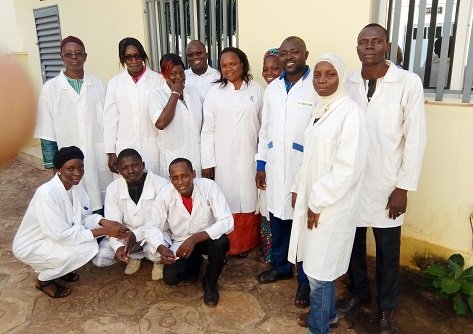|
Cycle 8 (2019 Deadline)
Production of commercial bioplastic-based biopesticide to control aflatoxin contamination in crops
PI: Amadou Hamadoun Babana (ahbabana@laborem-biotech.com, amadou.babana@usttb.edu.ml), University of Sciences, Techniques, and Technologies
of Bamako (USTTB)
U.S. Partner: Hamed K. Abbas, United States Department of Agriculture/ Agricultural Research Service
Project Dates: August 2020 - November 2021
Project Overview
 | | The PEER team outside the lab (photo courtesy of Dr. Babana). |
Peanut and maize are important crops in West Africa, mainly due to their contribution to poverty reduction and food security, but contamination of these crops by aflatoxins, produced mainly by Aspergillus flavus, constitutes a major constraint. Because of the compound’s high toxicity, the European Union has banned the import of peanuts with an aflatoxin content above 4 μg/kg, restricting African peanuts in international trade and raising important health concerns in West Africa and elsewhere for those exposed to these toxins at high levels.
Scientists from the PI’s institution have shown that a locally isolated Bacillus sphaericus OP6 inhibits fungal growth and aflatoxin production by more than 90% under laboratory conditions but was less effective on peanut crops under field conditions. Granules of bioplastic (cornstarch-based material) have been investigated as an alternative nutritive carrier for biocontrol microbes and compounds. The primary goal of this PEER project was production of commercial bioplastic-based biopesticide to control aflatoxin contamination of crops in Africa, improving the peanut production sector, lowering pesticide expenses, and alleviating smallholder poverty, including women peanut farmers. This project builds on the research experiences of the PI and his project team, as well as a previous PEER grant.
The project sought to include women in the bioplastic biopesticide production and commercialization processes and ensure that they have access to training on the technology. Techniques and technologies developed in this project with peanut farmers can be readily transferable to other crops such as cereals, and relationships developed with farmers built trust to enhance farmer amenability to the adoption of other sustainable agriculture practices.
Final Summary of Project Activities
The researchers isolated an Aspergillus flavus strain that cannot produce aflatoxin and Cyclopropionic acid (CPA). With training from the U.S. partner, they produced potato starch bioplastic and formulated bioplastic-based biopesticides containing atoxigenic Aspergillus flavus or the Bacillus sphaericus OP6 spores.
Twenty-five farmers participated in the biopesticide field test, and more than two hundred farmers attended field visits to see results. Results showed that the use of these biopesticides led to the production of peanuts and maize with aflatoxin contents lower than the European standard. The PEER team presented their findings at universities, the Malian Academy of Science, and for farmers, researchers and agricultural dealers. They also organized workshops and a training course, which attracted participants from more than 40 stakeholder institutions in the country on biopesticides for cereal crops.
The PI received two new grants, worth a total of about $220,000, for related work from the Competitive Fund for Research and Technological Innovation (FCRIT). The project results attracted significant attention, and the president of the Malian Association of Users of Research Results contacted the team seeking more information and to obtain the biopesticide, which is now in great demand among peanut producers from the testing phase. After two working sessions, they decided to aim to provide the biopesticide to all producers in the major peanut and maize production areas in Mali. The team met with a biopesticide production company collaborating with the association to facilitate expanded access to the biopesticide. Another biopesticide production company also expressed interest in the product and decided to participate in further field tests. If the results are proven in these additional tests, the company plans to provide financial support to improve the biopesticide further.
Back to PEER Cycle 8 Grant Recipients
|
|
|
|




